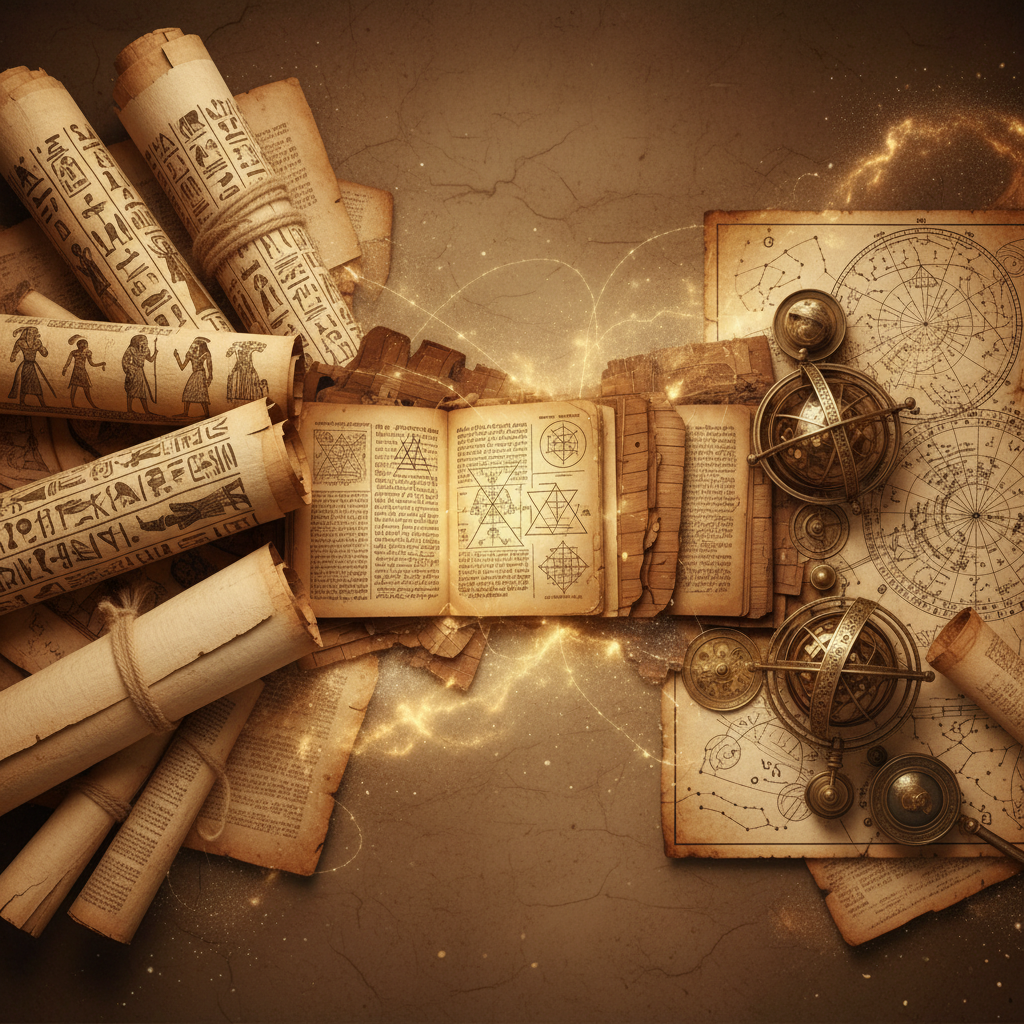The Detailed History of the Akashic Records

The idea of a universal library of knowledge is a timeless human concept. While the specific term "Akashic Records" is a relatively modern invention, its roots stretch back to ancient civilizations and their mystical beliefs about the nature of the cosmos and consciousness. Before diving into the history, make sure you understand what the Akashic Records are.
Ancient Roots and the Book of Life
The core concept of a celestial record-keeping system is found in numerous ancient cultures and religions. In the Old Testament (Psalm 69:28), there are references to a "Book of the Living" or "Book of Life," in which the names of the righteous are written. This concept reflects a fundamental human intuition that our lives and actions are part of a larger, permanent record. Similarly, in Islam, the "Preserved Tablet" (al-Lawh al-Mahfuz) is believed to contain the decree of God regarding all of creation.
In ancient Hindu philosophy, particularly the Samkhya school, "Akasha" was understood as the first and most fundamental of the five great elements, the very essence of space and ether. This Akasha was considered the repository of all energy and sound, a concept that laid the philosophical groundwork for the later development of the Akashic Records. You can find a definition for Akasha in our glossary. The ancient Egyptians also spoke of the "Thoth's library," where the wisdom of the gods was stored, and the Mesopotamians had the "Tablets of Destiny," which held the fate of the universe.
Theosophy and the Birth of the Modern Term
The term "Akashic Records" was formally coined in the late 19th and early 20th centuries within the Theosophical movement. Helena Blavatsky, a co-founder of the Theosophical Society, was the first to introduce the concept to the Western world in her seminal work, *The Secret Doctrine*. She claimed to have been taught by Tibetan mahatmas about a "tablet of the astral light" that held a permanent record of everything that has ever occurred.
Following Blavatsky, other Theosophists like Alfred Percy Sinnett and Rudolf Steiner further elaborated on the idea. Steiner, who later founded Anthroposophy, delivered numerous lectures on the topic, describing the Akashic Records as a kind of spiritual perception that allowed one to read the history of the world and humanity. Steiner believed that this information was accessible to anyone who underwent the necessary spiritual training, a theme we continue to explore in our guide on who can access the Records.
Alice Bailey and the Age of Enlightenment
In the mid-20th century, Alice Bailey, another key figure in modern occultism, expanded on the Theosophical teachings. Through her telepathic communication with "The Tibetan," she provided detailed information on the energetic structure of the Records. She emphasized that the Records were not just a historical archive but an active field of energy that influenced the evolution of humanity. Her work paved the way for a more psychological and developmental understanding of the Akasha.
Edgar Cayce: The Sleeping Prophet
It was the American psychic Edgar Cayce who truly brought the Akashic Records into the public consciousness in the 20th century. Cayce had the remarkable ability to enter a deep trance state, from which he claimed he could access the Akashic Records. From this state, he would deliver "readings" for individuals, revealing details about their past lives, current health conditions, and soul's purpose.
Cayce's thousands of documented readings provided a vast and practical body of work that demonstrated the potential of the Records for personal healing and spiritual growth. He moved the concept from an abstract philosophical idea to a tangible tool for self-discovery. His work showed that the Records could be used to understand soul contracts and the deeper reasons behind our current life circumstances.
Modern Synthesis: Science and Spirituality
Today, the history of the Akashic Records is entering a new chapter where ancient wisdom meets modern science. Thinkers like Ervin Laszlo have proposed the "Akashic Field" theory, which uses concepts from quantum physics to explain how information could be stored in the fabric of the universe itself. This scientific bridge is making the concept more accessible to a wider audience, including those who approach spirituality from a more logical or analytical perspective.
Furthermore, the rise of digital technology and artificial intelligence has provided new metaphors for understanding the Records. We now see the Akasha as the ultimate "cloud storage" of the universe, an interconnected network of information that is both vast and instantly accessible. Modern practitioners like Linda Howe have also contributed by creating structured methods like the Pathway Prayer Process, making the Records even more available to the general public.
